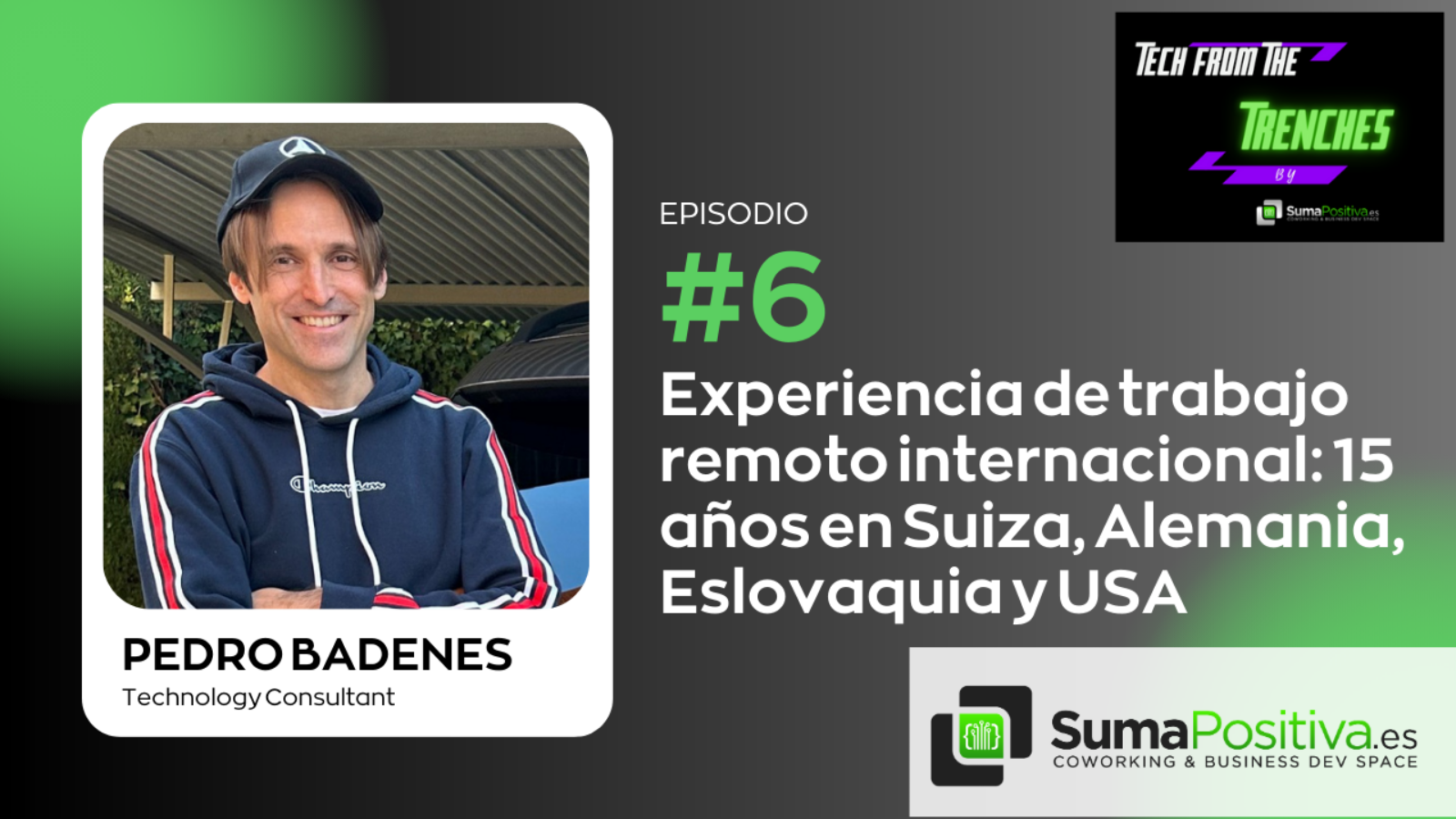International Remote Work Experience: 15 years in Switzerland, Germany, Slovakia, and the USA.
Pedro Badenes, a computer engineer and technology consultant for an international company in the food and retail industry, visited our coworking space.
Pedro has worked in the United States, Slovakia, Germany, and Switzerland throughout his professional life, which is why we knew he was the right person to share his experience, mistakes, and successes with the community.
Since joining his company (Revalize Software) over 15 years ago, Pedro has witnessed firsthand how a small company with 5 employees has grown to become a key player in the food sector with over 100 professionals. During this growth, he has had the opportunity to move between different physical locations in different countries.
Enrique and Bruno asked him some questions, such as:
What is your perception of the quality of life when working in other countries?
For Pedro, the concept of “quality of life” can vary depending on your personal situation at any given moment. In Spain, you can live with what you earn, but it may be more challenging in other countries.
When did you decide to go abroad? Was it easy?
Pedro was influenced by his friends who decided to go to Germany thanks to the Erasmus scholarships. He didn’t miss the opportunity to take the leap right after finishing his university studies, even though he didn’t speak German. Pedro explains that if you plan it better, you can make better use of the opportunity.
Those who want to take the leap should be aware that the experience may not go well. There are opportunities, but there is also a risk that it won’t turn out well. If you plan it properly, you can maximize the chances of a successful transition.
What advice would you give to those who want to make the leap?
The first and foremost is to learn languages. Being able to communicate becomes essential. Don’t just focus on English; open yourself to the possibility of understanding another additional language, even if it’s not perfect. It multiplies your opportunities once you are inside a foreign company.
If you surround yourself with people who speak good English, you will improve your own English skills. It’s a crucial ability, and if you don’t have it, you should go outside to seek it.
And in the technical field?
Specialize in what you want, but it’s essential to have a good understanding of everything around your area of expertise. Understand all the services and elements surrounding a technological application or digital product, for example, in our sector.
What about salaries? Is there a significant difference?
In countries like Germany, companies are focused on “WINNING.” They want to improve products, optimize processes, etc., and they are willing to invest in profiles that will evolve the solution or implement technologies that will help them in this task.
Pedro shares his view on the profitability for a country to educate engineers if these individuals are not remunerated accordingly to contribute back to society.
But there is also a lesser-known aspect, and that is working from Spain for other countries, which has its disadvantages due to the bureaucracy involved. Specifically in Spain, Pedro has the feeling that creating a company is a slow and complex process.
Are low salaries a consequence of exploitative entrepreneurship?
Pedro believes that it is a concept not aligned with reality, and the question should rather be what kind of companies you want to build as an entrepreneur. If the model and type of company are ambitious, they will reward their employees accordingly. Focusing on building a product and establishing a profitable and scalable business model are usually characteristics of companies that pay their employees well.
Is it possible to work asynchronously in technological projects?
Pedro has only experienced fully remote work 100% in his latest project in the USA. In this experience, the team gathers from their homes early in the morning, spanning various time zones for internal coordination of daily tasks
This work arrangement has two sides. On one hand, there is an increase in productivity, according to Pedro’s perspective. However, from a personal point of view, there is a risk of isolation.
We concluded the event by adding value through references and information sources that Pedro wanted to share with us.
Pedro is passionate about Java, and he mentioned some influential books by Robert C. Martin:
- “Clean Code: A Handbook of Agile Software Craftsmanship” by Robert C. Martin: Although not specific to Java, this book emphasizes the importance of writing clean, readable, and maintainable code, which is applicable to any programming language, including Java
- Solid Principles
In the field of computer science, there are more things than just development, systems, and other important services. It’s essential to master one language and have knowledge of others.
Pedro also mentions how platforms like Udemy facilitate knowledge acquisition, and there are many interesting videos available. For example, when it comes to Java, he talks about the Spring Framework Guru. Despite the author being somewhat long-winded, there is valuable knowledge in his videos.
And we conclude with the learning that Pedro would have liked to know years ago:
“I would recommend to the Pedro who went on Erasmus to plan it a bit more, with language learning as the main objective. On the other hand, I used to be very idealistic and self-demanding, but it’s good not to go crazy with pressures and demands.“
We look forward to having you in future podcasts. See you, guys and girls from the trenches.
We invite you to subscribe to our streaming channels and podcasts:


Add a Comment